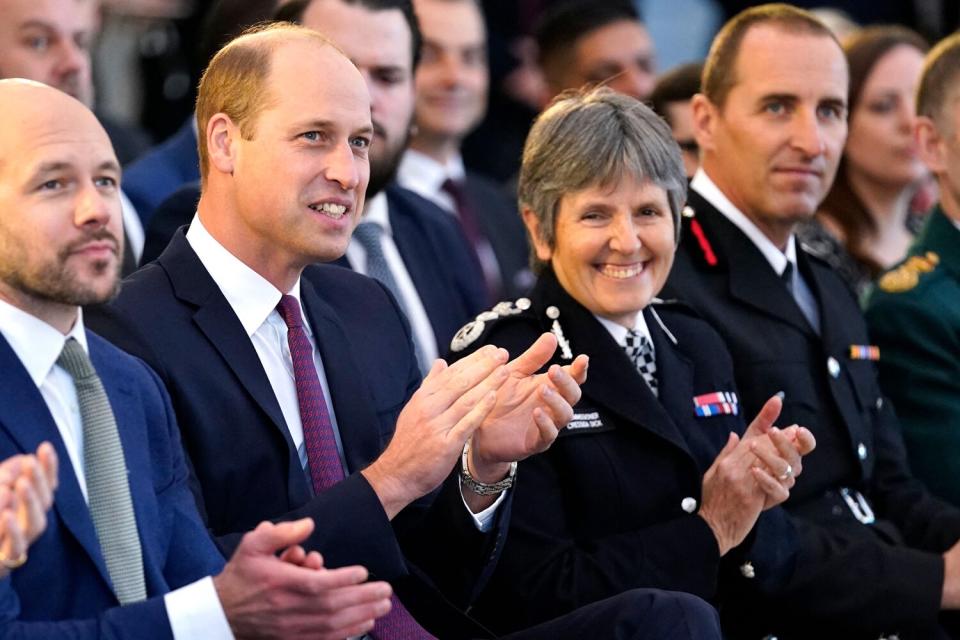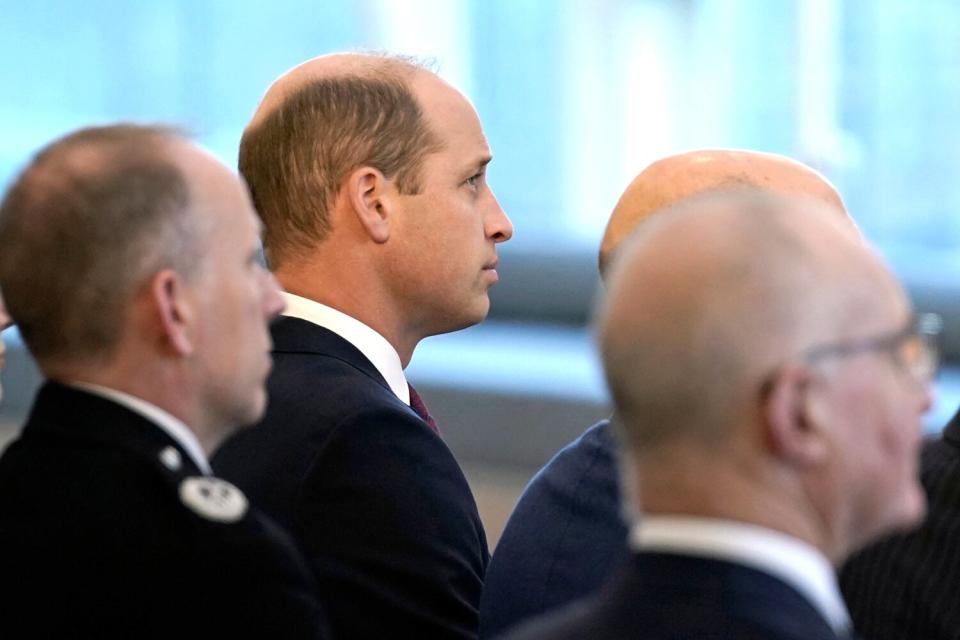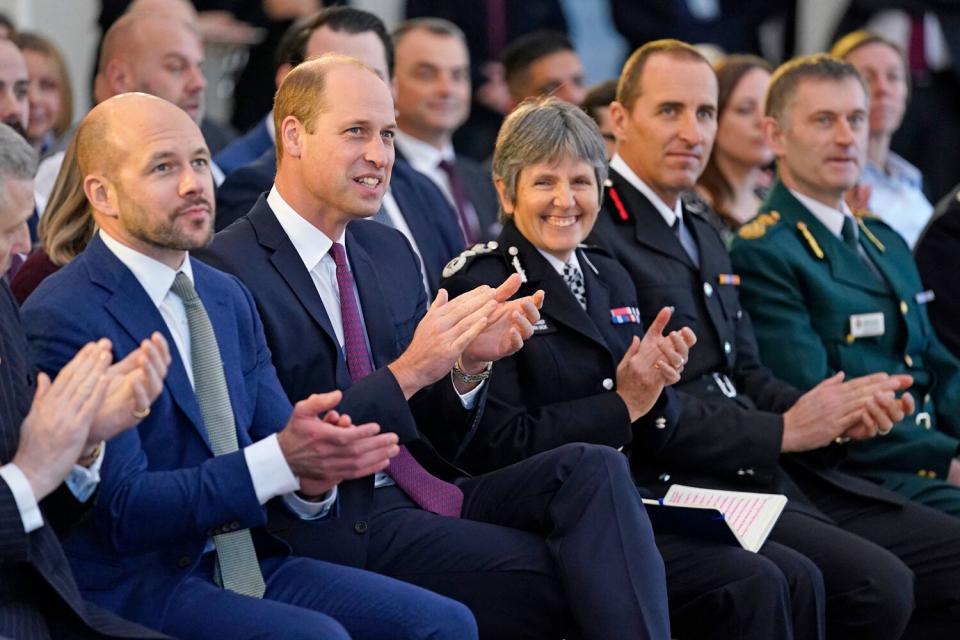Prince William on Mental Health Struggles as an Air Ambulance Pilot: 'I Had to Take Myself Away' to Cope

ANDREW MATTHEWS/POOL/AFP via Getty Images
Prince William is showing his solidarity with first responders who face mental health struggles because of the haunting situations they confront in their work.
The Duke of Cambridge, who worked as an air ambulance helicopter pilot after serving as an RAF Search and Rescue pilot, recalled his own challenges in a short film he has made with two emergency workers.
"When I was in the air ambulance, any job I went to with children, that really affected me — much more than if I hadn't had children actually," the father of three, 39, said. "So, for me, it was the relation of my personal life with the family or the incident I was at. I found that very difficult. There were a number of times when I had to take myself away because I was just getting too involved in it, and feeling it."
RELATED: How Prince William Helped Secure Safe Passage for Afghan Officer and Family
"Going to talk to someone else after the event was really important," he continued. "But it continues — it doesn't leave you there, you just manage it better."
The film covered a conversation he had with Emergency Care Assistant Chloe Taylor, 24, and Paramedic Will Parish, 27, from the South Central Ambulance Service NHS Foundation Trust in their home near Reading, Berkshire. It was played in full at a symposium, led by William's Royal Foundation on Thursday, which brought together the senior leaders from the emergency services from across the U.K. to address the mental health of their workforces.
Talking around the couple's kitchen table, William — who has in the past recalled his "daunting" work at East Anglia Air Ambulance — spoke about the particularly demanding year, as they faced COVID-19, saying they have seen "layer, upon layer of more deaths, more tragedy, more sadness."
Parish told him, "It was quite a daunting, scary time. A shock to the system. It was scary we were seeing . . . Everyone was afraid to the extent that we were resigned to the fact it was likely that you were going to get ill."
Taylor added, "It was really scary thinking that you might affect your family."
William highlighted how difficult it is sometimes for emergency workers to share what they see with their friends and families. "People want to protect their families, their loved ones from horrendous, and horrible and very sad things," he said. "But you're leading two different lives. You're blocking your loved ones out from a very important part of who you are and who you're becoming."
Parish agreed, "That's exactly what I used to do. I had work Will and home Will."

ANDREW MATTHEWS/POOL/AFP via Getty Images Prince William
The prince, who has campaigned for more support for emergency staffers, added, "There's nothing in the training to really promote that, is there? We're meant to individually adapt. You might not have the toolbox you need to deal with all these things. We need the training and we need the education to help."
Taylor told him, "I didn't notice myself, building up to that point where I wasn't OK but people around me noticed and they asked and they'd look after me." Her team leader urged her not to do so much overtime and to take some time "for myself."
At Thursday's meeting, Prince William gave a speech highlighting that it was the first time senior leaders from all four emergency services and all four U.K. nations had come together to discuss mental health.
"This is a big moment," he said. "And this big moment comes at a critical time."
William recalled "the pressure of attending calls in the most stressful conditions, sometimes with tragic conclusions. I remember the sense of solidarity with my team, pulling together to do the best we could and sharing the weight of responsibility. I also remember returning home with the stresses and strains of the day weighing on my mind, and wanting to avoid burdening my family with what I had seen."
William also announced the Blue Light Together package of mental health support for the emergency services. It is the latest move by him to improve the welfare of those who work on the frontline as first responders.
"Blue Light Together has been developed by The Royal Foundation with our partners and includes specialized information and advice to help emergency responders with their mental health, real-life stories and tips from serving personnel, and guides for employers so that they can support the wellbeing of their people," he said. "As part of Blue Light Together, we are developing a directory of therapists who have extensive experience of treating the complex mental health needs of emergency responders."

ANDREW MATTHEWS/POOL/AFP via Getty Images Prince William
Can't get enough of PEOPLE's Royals coverage? Sign up for our free Royals newsletter to get the latest updates on Kate Middleton, Meghan Markle and more!
In September last year, the Duke and The Royal Foundation convened the Emergency Responder Senior Leaders Board. The first of its kind, the Board brings together leaders from across all of the U.K.'s emergency services to work collaboratively on the issue of mental health and ensure that all emergency responders receive the support they need.
That came in response to research commissioned by The Royal Foundation in 2018, conducted by King's College London and the Open University, which identified a need for greater sharing of "better practice" across the emergency services sector to best support the mental health of its workforces.
